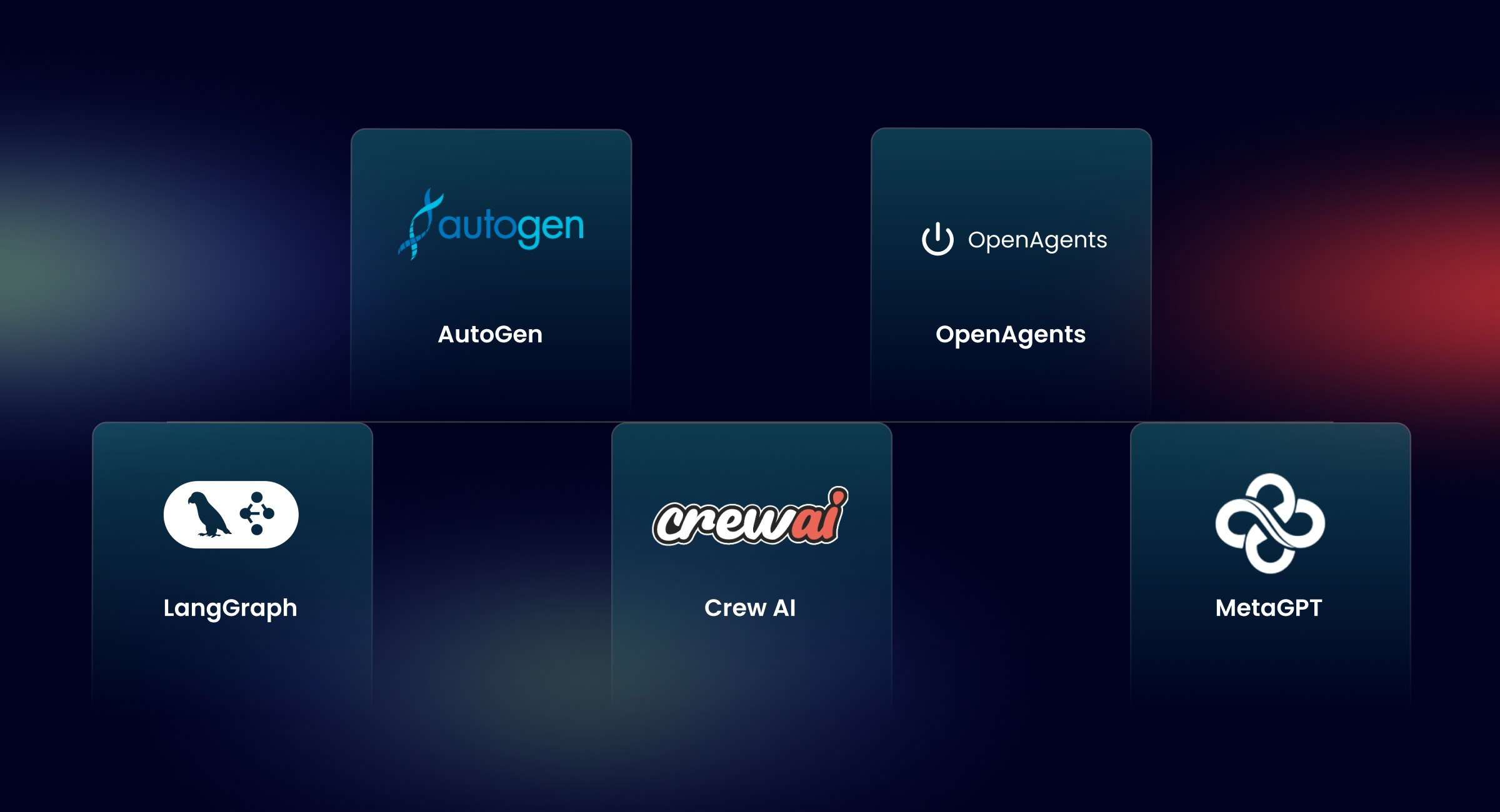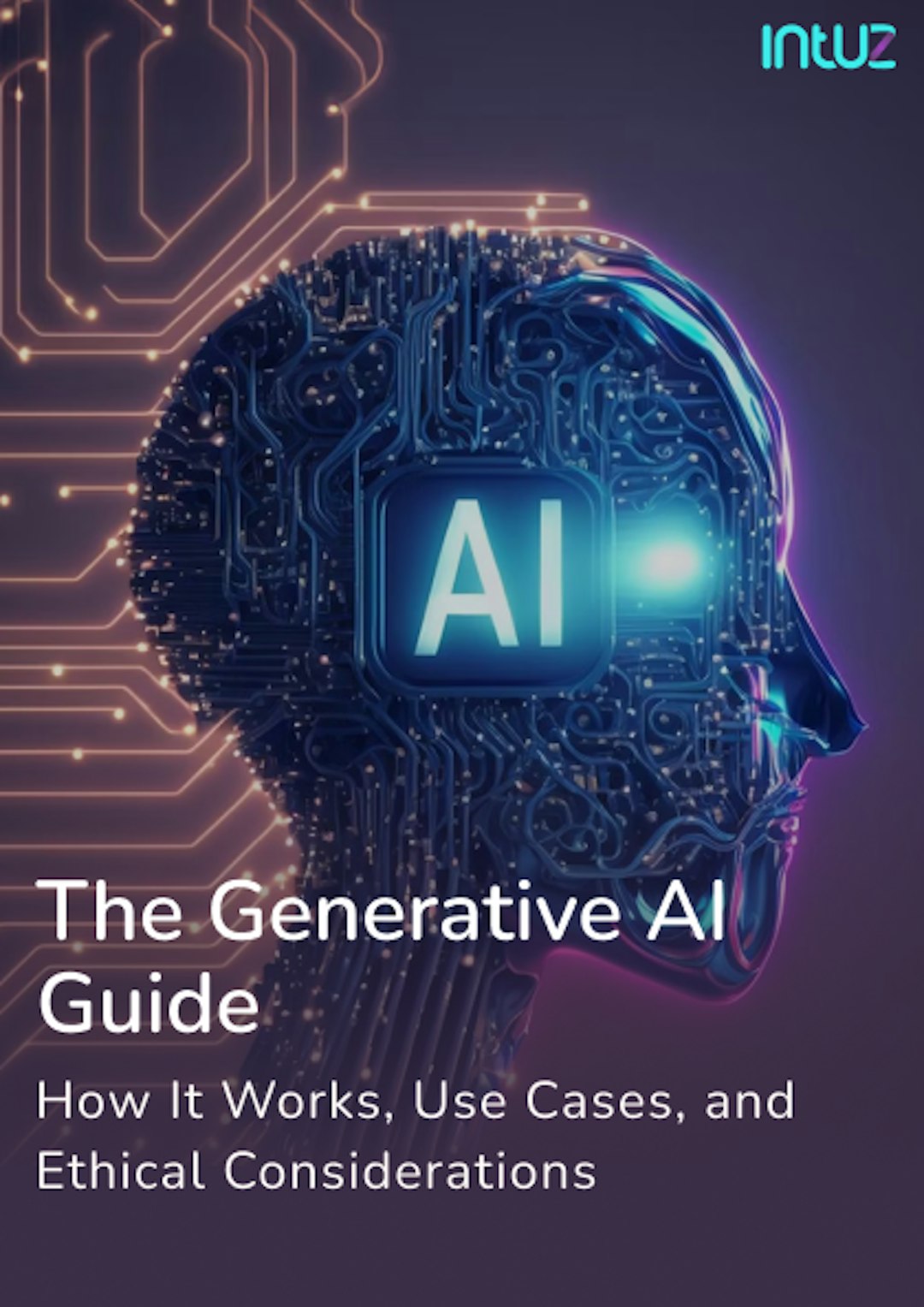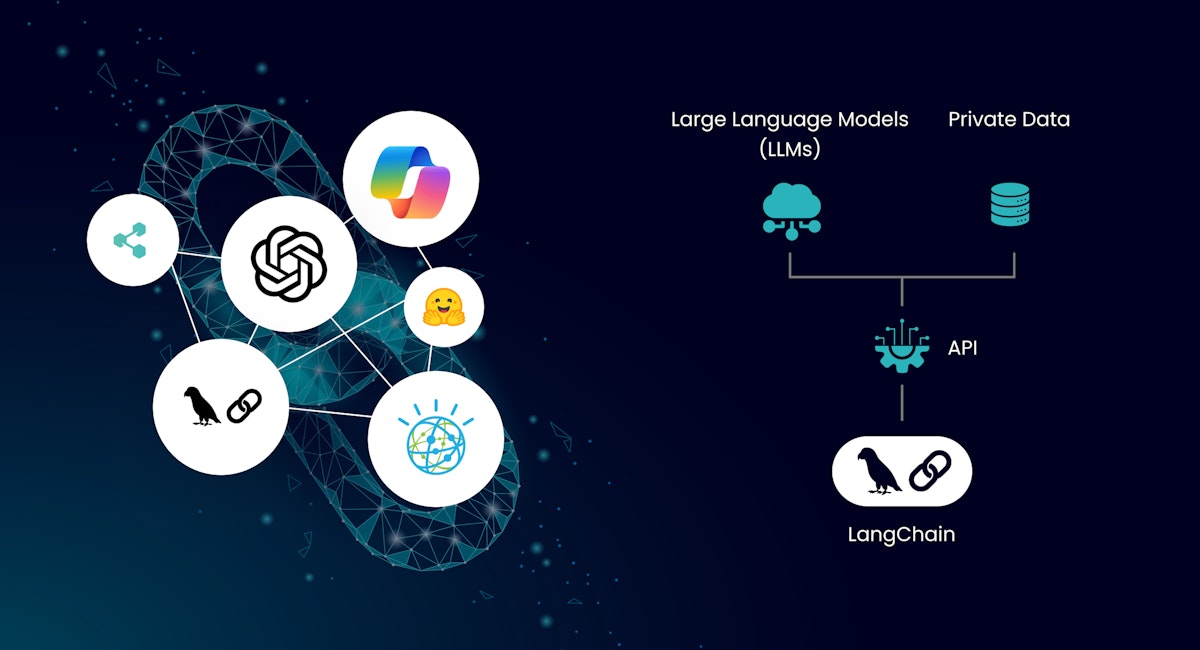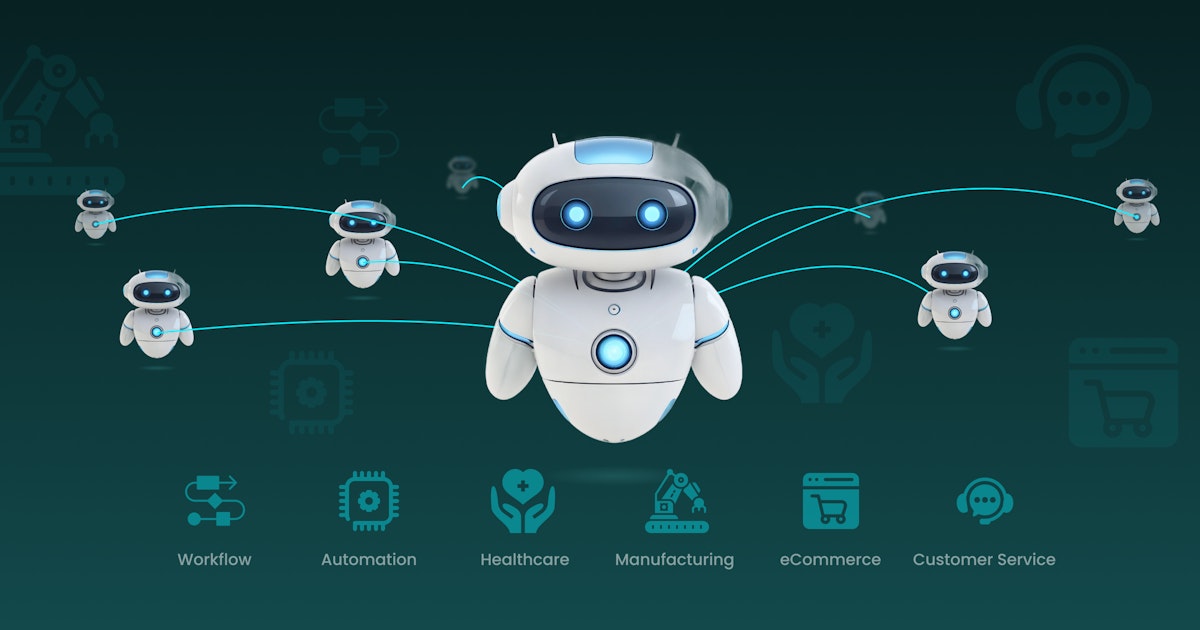Table of Content
You’ve probably heard a lot about AI agents lately. They’re showing up in conversations about customer support, operations, sales, and internal workflows. But here’s what matters: agent AI frameworks help businesses get more done with fewer manual steps.
They take tasks involving multiple people or tools, making them smoother, faster, and more intelligent. Now, as an SMB, you face different pressures than large enterprises:
- You’re experiencing rapid growth
- You need to keep a close eye on costs
- You want to get things done as efficiently as possible
That’s why it makes sense to explore agentic AI. And you don’t even need to build everything from scratch. There are some remarkable frameworks you can use to make the process easy. This blog post will analyze the best AI agent frameworks in 2025.
Top 5 Most Popular & Highly-regarded AI Agent Frameworks in 2025
Want help navigating the options? We’ve chosen the top agentic AI frameworks that can help you move the needle for your business

1. LangGraph
LangGraph is an open-source library built by LangChain that provides a framework for creating stateful, multi-agent apps using LLMs. It enables you to model and manage complex AI agent workflows across businesses as directed cyclic graphs, fusing more control and flexibility in agent interactions.
Key features
- Add moderation, approval, or validation steps where needed, so agents stay aligned with business logic and guardrails
- Store memory and context across sessions for long-term interactions and more personalized user experiences
- Visualize and stream agent behavior token-by-token for smoother, debuggable, real-time UX
Business use cases
- Build agents that retrieve data from internal knowledge bases, documents, and CRM systems, handling multi-turn conversations
- Embed custom AI agents into your SaaS product to automate workflows, provide data insights via natural language, and integrate securely with user-specific tools and systems
Best for: teams that want a balance between control and rapid iteration, like SaaS startups, operationally complex businesses, or product teams building agentic features.
2. Microsoft AutoGen
Microsoft AutoGen is an open-source programming framework from Microsoft that helps build and deploy AI agents that can work together to solve complex problems by collaborating, sharing information, and performing tasks autonomously. AutoGen is designed to be flexible, scalable, and easy to use.
Key features
- Build your own private LLMs, tools, memory stores, and custom logic without modifying the core architecture
- Handle everything from short-lived tasks to persistent, long-running agents with a scalable architecture
- Build agents that interact across programming languages, platforms, and APIs
Business use cases
- Create assistants that delegate tasks among sub-agents, each focused on a specific domain (e.g., finance, legal, ops)
- Coordinate agents that operate across departments, tools, or data silos for seamless internal workflows
Best for: teams that need transparency and observability during development and production
3. CrewAI
CrewAI is an open-source Python framework that orchestrates AI workflows using a coordinated team of agents called “crews.” Support for code-based and no-code development enables fast deployment of agent automations across different business functions, including supply chain, HR, and media.
Key features
- Use visual builders for fast iteration or write custom logic for complete control
- Connect agents to internal systems, APIs, or third-party tools with minimal setup
- Track agent activity, adjust behaviors, and involve humans in the loop when needed
Business use cases
- Automate market trend tracking, competitor analysis, and customer insights collection
- Run dynamic, multi-step campaigns with agents that adjust strategy based on real-time data
Best for: marketing teams, research departments, and mid-sized businesses looking for a low-barrier entry into agent automation
4. OpenAgents
OpenAgents is another open-source framework that creates, hosts, and manages AI agents that can perform cognitive tasks and handle financial transactions. Although still in beta, OpenAgents is a brilliant tool for developers and experimental teams that want to explore the intersections of AI and payments.
Key features
- Create and control agents via API, enabling task automation or user delegation
- Agents can generate and pay invoices, check balances, and execute payment flows
- Each agent can manage its wallet, making it capable of sending, receiving, or holding funds
Business use cases
- Deploy customer service agents who generate invoices, send reminders, and track payment status for recurring services
- Build decentralized apps where agents autonomously manage funds and interact with Blockchain-based financial systems
Best for: fintech startups, tech-forward teams, and Web3 developers that often deal with prototyping financial automation
5. MetaGPT
MetaGPT is a multi-agent framework purpose-built to automate software development. It simulates a full-stack product team—PMs, tech leads, developers, and analysts—as coordinated AI agents for business automation that follow standardized engineering workflows.
MetaGPT is perfect for carrying out early-stage ideation, Proof-of-Concept (PoC) development, or augmenting engineering capacity when resources are tight.
Key features
- Enter a high-level product idea or spec, and MetaGPT orchestrates the end-to-end development process, from design to code and documentation
- Each agent embodies a specific software role (e.g., project manager, architect, engineer) and contributes based on predefined responsibilities
- Personalized for engineering use cases, delivering APIs, scripts, docs, and whole codebases with minimal manual input
Business use cases
- Simulate early-stage project planning, architecture evaluation, or backlog creation
- Build lightweight tools and automation projects to support business operations or R&D
Best for: startups, solo founders, and lean product teams that need to ship fast without compromising quality
10 Best AI Agent Development Companies in USA in 2025
Explore NowKey Consideration When Choosing Best AI Agent Framework
At Intuz, we’ve worked closely with businesses of all shapes and sizes and learned that clarity at the start saves time and money. Here’s how you should choose an agentic AI framework to meet your requirements:

1. Identify your use case first
Before diving into feature lists or benchmarks, define your goal. Are you trying to automate support? Build a research assistant? Streamline internal operations?
Intuz believes the clearer the objective, the easier it is to match the right tools. It’s essential to articulate the use case in practical terms.
2. Evaluate agent role complexity
Some agentic AI frameworks shine when agents need to carry out simple tasks in a sequence. Others better manage multi-agent collaboration with memory, goal-setting, and task planning. Here’s a tip we always give our clients: How will your agent operate in the real world?
In addition, it needs to figure out how much autonomy it needs, how many roles it plays, and how often it needs to adapt.
Once you know this, moving towards a setup that can support that complexity without adding unnecessary overhead will be easier. Don’t worry, we’ll help you with that.
3. Ensure your tech stack is compatible
There’s no point in choosing a framework that won’t work smoothly with what you already have. We check how well it integrates with your current systems, whether you’re working with Python, cloud-native tools, or something more custom.
Intuz experts aim to plug the proper framework into your workflow with as little friction as possible.
4. Calculate cost vs. value
Some open-source AI agent frameworks are free to use but expensive to scale. Others save time but come with hefty licensing fees. Intuz helps you think through the trade-offs in real terms: setup effort, security, support, and how all of it fits into your budget.
And because we work on an outcome-first billing model, you always know what you’re committing to from the start. No hourly rate surprises. No pushing for features in multi-AI agent systems you didn’t ask for.
We believe in having a shared goal and a clear path.
5. Think about future scalability
It’s easy to plan for what you need right now. But we also help you think ahead. Building on a foundation that won’t buckle under pressure is vital if your SMB expects to grow by adding more features, users, and data.
We look at agentic AI frameworks that scale smoothly and evolve with your business, so you won’t have to hunt for a different option every time your operations expand.
How to Build Multi AI Agent Workflows Using LangChain
Learn moreHow Intuz Can Help SMBs Build and Deploy Agentic AI
Getting from an idea to a working solution can feel overwhelming when working with AI agents. There are many moving parts—business goals, technical decisions, and data questions—that don’t slow down.
That’s where we come in.
At Intuz, we work with you to determine what needs to happen, in what order, and why it matters for your business. We follow a streamlined, outcome-driven process:
- Start with an in-depth business use case analysis
- Move quickly into rapid prototyping and PoC development
- Ensure a secure, scalable, production-ready deployment personalized to your infrastructure
But what sets our AI development company apart?
- AI-first approach: You’re building with intelligence at the core, and that’s precisely how we think too; we approach every project through the lens of what AI agents can truly enable—autonomy, adaptability, and ongoing learning
- Rapid turnaround: We keep things tight and focused, working in sync with your team, sharing clear updates, and helping you ship faster without cutting corners
- Business value focus: Whether it’s reducing cloud costs, getting to market faster, or validating a proof of concept, we make sure the work adds up to something meaningful—and measurable—for your business
- Agile and future-ready: You stay in control, your data remains secure, and your team can scale the solution without hitting walls
In addition, we’ve worked with all the multi-agent frameworks discussed in the blog, such as LangGraph, Microsoft AutoGen, CrewAI, OpenAgents, and MetaGPT. We can help you evaluate, test, and implement the right ones for your needs.
So, if you’re thinking about building something with open-source AI agent frameworks and want a partner to meet you where you are, we’d love to connect.
Book a free consultation with Intuz today. We promise it’ll only be a 15-minute call but every second will be worth it.







